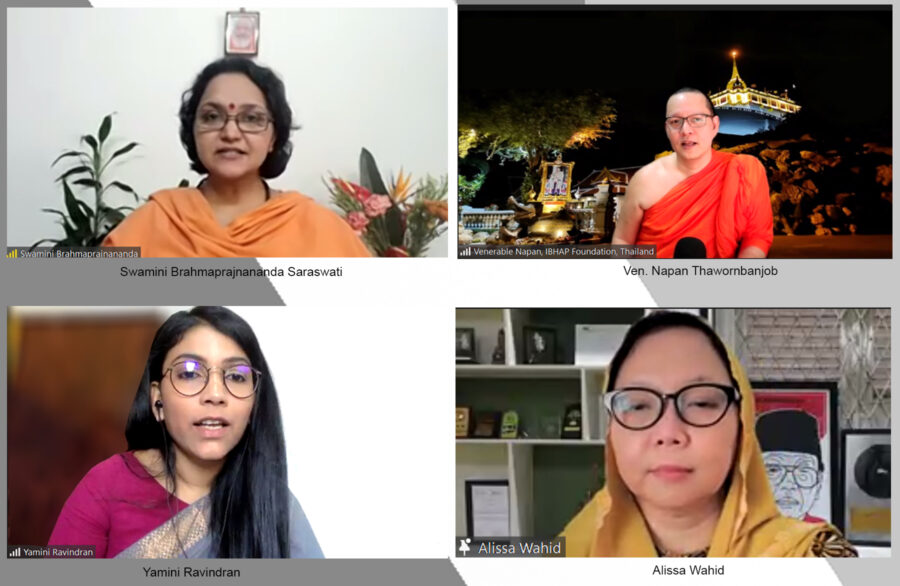Interfaith leaders share new paradigms for combating religious extremism in Asia

‘Combating Resurgence of Religious Extremism in Asia: Role of Religions’ was the focus of the thematic discussions on the second day of the Christian Conference of Asia’s (CCA) Asia Regional Consultation on ‘Freedom of Religion, Rights of Religious Minorities, and Constitutional Guarantees in Asia’.
Faith leaders belonging to Hinduism, Buddhism, Islam, and Christianity affirmed in unison through their presentations that exclusivism was the precursor to extremism, and that hospitality, respect, and acceptance formed the essence of the values and ethos of all four major religions. The panel suggested different forms of joint action and mutual cooperation to defeat extremist tendencies.
Swamini Brahmaprajnananda Saraswati, a Hindu monk from India, referred to the historical respect and acceptance that Hinduism had accorded to other religions.
“Hinduism is a vision of interconnectedness of all beings and their underlying oneness. We recognise that all religions do not function in the same way, but are valid forms of worship, and that people have the freedom to practice their own religion,” shared Swamini Saraswati.
She also shared the challenges of religious extremism, terming the emergence of certain new strands of nationalism and fundamentalism as a ‘push-back reaction’ against societal discord and conflict.
The Venerable Napan Santibhaddo Thawornbanjob, a Buddhist monk from Thailand, shared a practical overview of how the power of religious leaders could be harnessed for social good.
The Venerable Thawornbanjob spoke of the role of Thai Buddhist monks at the grassroots during the COVID-19 pandemic, such as opening up temples for isolation and medical help, and preparing and distributing food to the affected—at times even breaking customary rules to save lives. He also provided examples of how the monks had leveraged social media and online forums to nourish their followers with ‘spiritual food’.
“We share a message of coexistence—not only during periods of difficulty, but also during periods of normalcy,” stated the Thai Buddhist leader.
Alissa Wahid, an Islamic leader from the Nahdlatul Ulama (NU), the largest Islamic organisation in Indonesia with over 60 million members, differentiated between religious exclusivism and religious extremism, stating that the former was a precursor to the latter.
“The mainstreaming of religious exclusivism is a worrying trend…this must serve as a wake-up call for us. We must be as aware of religious exclusivism as we are of religious extremism, as exclusivism can spiral into extremism,” shared Ms Wahid.
Ms Wahid, who also represented the Gusdurian Network in Indonesia offered the models of several best practices for sustainable and structural change as implemented in her country. One approach was the ‘Integrated Strategic Approach’ which involved ‘Rights-based (public policy)’, ‘Respect-based (power of CSOs and FBOs)’, ‘Resilience-based (grassroots/people level)’, and ‘Faith-based (theological frameworks)’. She also provided a conceptual framework for religious moderation.
Yamini Ravindran, the Executive Director for the Asia Evangelical Alliance’s (AEA) Religious Liberty Commission, shared the Christian justification for the pursuit of religious freedom, which included the differentiation between religious and political authority, the idea of conscience (as seen in Romans 14:5), Imago Dei, and Jesus’ use of persuasion rather than coercion, and the renunciation of armed protection.
Ms Ravindran, who also serves as the Associate Secretary General of the National Christian Evangelical Alliance of Sri Lanka (NCEASL) further shared the Christian vision of religious pluralism and elaborated upon ‘confronting the extremism within’.
“Christian mission leaves no room for sentiments of supremacy or an attitude of triumphalism. Rather, it extends grace, hospitality, and a welcome that removes cause for religious animosity and violence, and even more specifically, aggressive or unethical modes of evangelism, which continue to be an allegation made against Christian communities operating in the contexts of multireligious settings,” said Ms Ravindran.
The panel collectively affirmed the necessity of developing stronger interfaith networks and alliances to promote better understanding and relations at the macro level while engaging and strengthening the role of faith leaders as agents of change at the micro level.
During a plenary session, the participants debated the links between violent extremism, politics, and religion; they called for an increase in engagement with young people through promoting positive youth resilience and youth-led activism against extremism, and advocated for the development of counternarratives to encourage critical thinking and self-reliance as well as to raise awareness, foster key relationships, and discredit extremist ideologies and propaganda.
The proceedings on the third day of the Consultation, 7 October 2021, will focus on Constitutional Guarantees and Religious Freedom in Southeast Asia and South Asia.











